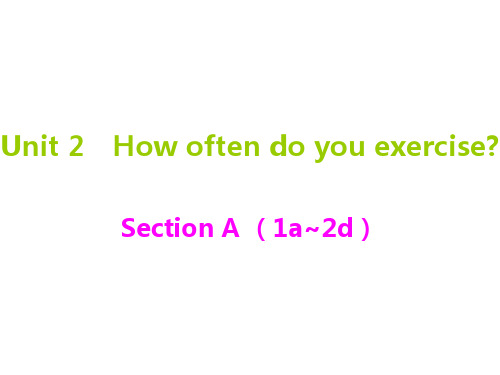八年级上册英语第二单元课件
人教版八年级英语上册第二单元课件

The results for “watch TV” are interesting.
_S_o_m__e students watch TV once or twice a week,
s_tio_m_me_es_
students watch TV __t_h_r_e_e__ _o_r_ _f_o_u_r__ a week, but most students watch _e_v_e_ry_
Do you know?
• sometime 某个时间 • some time 一段时间 • sometimes 有时 • some times 几次
I sometimes go to school by bus. I will go to America sometime this year.
人教版初中英语 八年级上册教学课件
Unit 2 How often do you exercise?
Section A Period 1
Are you healthy?
Do you often drink milk? Do you eat fruit and vegetables everyday? Do you often do your exercise?
八年级上册英语第二单元ppt课件

Key presence analysis
Identify the key presence of each paragraph
The key presence expresses the paragraph's main idea and commonly appears at the beginning or end of the paragraph
Derivatives
Key vocabulary often has derivative words that can help in understanding the meaning and usage of the root words
Example of vocal application
Domain specific vocabulary
Vocabulary related to a specific subject or domain, such as science, technology, literature, etc
03
General/basic vocabulary
Common words that are widely used in daily life and have a
Read through the exercise carefully, paying attention to details and making notes as necessary
05
Writing training
Writing Skills Tips
Use appropriate language
Example sentences
I watch TV every day He watches football games They watch movies on weekends
八年级(上册)英语第二单元课件.ppt

1b
exercise do some reading
go shopping
watch TV
e
help with housework
4. have …lesson 上….课 eg: 上英语课 have English lesson 上钢琴课 have piano lesson lesson 为可数名词
5. 他经常去踢足球在星期天。 He often _p_la_y_s_ football on S__u_n_d_a_y.
6. Tom 从来不帮忙做家务。 Tom _n_e_v_e_r _h_e_l_p_s_ with housework.
7.我的奶奶很少外出。 My grandma _h_a_r_d_ly__ __e_v_e_r__ goes out.
1. help sb with sth
帮助某人
help sb (to) do sth 做某事
help with sth 帮助做某事 2. housework 不可数名词
What do you do on weekends?
I hsuaoonsrlfmwudteeavlenyleytlirysemvers play football on weekends.
2. Ask and answer, complete the chart.(P16 ,Part 1)
3. To read and remember the new words.
Unit 2
Section A 2d~3c
人教版八年级英语上册课件:Unit 2(共29张PPT)

要点梳理
( )2. We need a good night’s sleep because we have got a _____ day tomorrow. A. empty B. hungry C. full D. free ( )3. Don’t _____ the bowl with water because it will spill(溢出). A. fill B. full C. filled D. fills
要点梳理
【应用】 ( )1. Sun Yang _____ every day and he swims very well. A. exercise B. exercises C. do exercise D. does exercises
要点梳理
B
( )2. Tom does eye _____ in the classroom after doing math _____ for half an hour. A. exercises; exercises B. exercise; exercise C. exercises; exercise D. exercise; exercises
【举例】He can hardly speak English. 他几乎不会说英语。 They hardly ever spoke another word. 他们几乎没有再说一句话。 He can hardly understand it, can he? 他几乎不懂,是吗?
要点梳理
课前导学
three times a week
use the Internet
swing dance
have to
你周末通常做什么?
人教版八年级英语上册Unit2SectionB1a1e教学课件

d
ef
be good for our health be bad for our health
1b PAIRWORK
Ask and answer questions. Use the words from 1a.
A: How often do you drink milk, Liu Fang? B: I drink milk every day. A: Do you like it? B: No. But my mother wants me to drink it.
She says it’s good for my health.
junk food once a month
A: How often do you eat junk food? B: Once a month. A: Do you like it? B: Yes. But my mom says it’s not good
Consolidation
1c Listen to an interview about two people’s daily habits. Circle your answer to each question.
Does Tina have good habits? don’t know.
Does Bill have good habits? don’t know.
Tina
___e_v_e_r_y_d_a_y___ ___e_v_e_r_y_d_a_y___ _____n_in_e______ ___e_v_e_r_y_d_a_y___ two _or_th_ree_t_im_es_a_w_ee_k ___ ____n_e_v_e_r_____
八年级英语上册第二单元PPT课件

.
21
• go shopping
• go + 动词ing 表示进行某种活动
• 如: go hiking go skating go fishing go swimming
• do some/the +动词ing 是 go + 动词ing的同 意短语。
• 如: do some fishing do some washing
• 3. Make is so busy that he ____goes to the movies.
• 4. On Saturdays, Lily sometimes reads books, and _____ she watches TV.
• 5. She gets up very early every day, so she is ____ late for school.
in
1) 用于表示较长的一段时间,如年份、季节、月 份等;
2) 用于泛指一天的上午、下午、晚上等。
at
1) 表示某一具体时刻; 2) 表示多少岁; 3) 用在表示时间的固定短语中。
.
30
• ___ June.
____ Teachers’ Day
• ___ the morning. ____ summer
• 2. I have piano lessons ______(two) a week.
• 3. They watch TV _____ (three; time) a week.
.
11
• 表示: • “一次”要用 once, • “两次”要用 twice. • “三次及三次以上”要用 • “基数词+times”
人教版八年级上英语第二单元课件.ppt
watch TV _th_r_e_e_o_r__fo_u_r_t_im__e_s a week, but most students watch TV_e_v_e_r_y_d_a_y_ .
Exercises
• Discuss with your partners your daily • activities. How often do you do them?
• He was always asking for money. • 他总是要钱。(表示厌烦) • She is always asking for leave. • 她总是请假。(表示不满)
• ▲always与not连用,表示部分否定,意思是 “不总是”。例如:
• The rich are not always happy. • 有钱人未必总是幸福的。
Reporter:How often do you exercise? Cheng :Oh,I exercise about three
times a week. Reporter:How often do you shop? Cheng :Shop? I shop about ... about
• B: It’s exciting.
Explanation
• 1. I often go to the movies. • 频度副词 always, usually, often, sometimes,
hardly和never是英语中最常见的频度副词,它们 在句中的位置大致相同:通常放在行为动词之前, 系动词be、助动词和情态动词之后。但它们所表 示的含义及频度是各不相同的。
人教版英语八年级上册精-第二单元ppt课件
可编辑ppt
4
What do you do on weekends? I often/usually/...
often go shopping
hardly ever
help with housework
可编辑ppt
5
What do you do on weekends? I often/usually/...
hardlyever, never 与疑问词 how often 对应。表示的频率由 always 向 never 递减。
在句中位于实意动词之前,情态动词(can 等)、助动词(do 等)、连系动词(be 等)之后。但 sometimes 也可在句首。
Unit 2 How often do you exercise?
2d. Role-play the conversation.
可编辑ppt
18
1. Claire has piano lessons __t_w_i_c_e__ ( two ) a week.
2. He watches TV ___o_n_c_e__ (one) a week.
3. Katrina _e_x_e_r_c_is_e_s_ ( exercise ) every day.
( 你多久看一次电影?)
( 我大概一个月看一次电影。)
__H_o_w__o_f_te_n__d_o_e_s_h_e_w__a_tc_h__T_V_?____ ( 他多久看一次电视?)
_H_e__h_a_rd_l_y_e_v_e_r_w__a_tc_h_e_s_T_V__. ______ ( 他几乎不看电视。)
often Cheng Tao does them.
可编辑ppt
八年级上册英语unit2课件
八年级上册英语unit2课件Unit 2 Lesson Plan for Grade 8 EnglishIntroduction:In the eighth grade English curriculum, Unit 2 focuses on developing the students' speaking and listening skills. This unit aims to enhance their ability to communicate effectively in English through various interactive activities. The lesson plan for this unit is designed to engage students in meaningful discussions and encourage them to express their thoughts and opinions confidently.1. Warm-up Activity:To start the lesson, the teacher can organize a warm-up activity to activate the students' prior knowledge and create a positive learning atmosphere. This activity could involve a short video clip related to the topic of the lesson, followed by a class discussion. For example, if the lesson is about environmental issues, the teacher can show a video about pollution and ask the students to share their thoughts on the topic.2. Vocabulary Building:Next, the teacher can introduce new vocabulary words related to the lesson's theme. They can use various techniques, such as flashcards, word association, or even a vocabulary game, to make learning new words more engaging. The teacher can also encourage students to use the words in sentences to reinforce their understanding and usage.3. Reading and Comprehension:After building the vocabulary, the teacher can provide a reading passage or a short story that aligns with the lesson's theme. The reading material should be appropriate for the students' English proficiency level and interesting enough to capture their attention. The teacher can ask comprehension questions to check the students' understanding and encourage them to discuss the text in pairs or small groups.4. Speaking and Listening Activities:To enhance the students' speaking and listening skills, the teacher can design interactive activities. For example, they can divide the class into pairs or small groups and provide them with discussion questions related to the lesson's theme. The students can take turns expressing their opinions and actively listening to their peers. The teacher can also facilitate the discussions by providing feedback and guiding the students to use appropriate language expressions.5. Role-plays and Presentations:To further develop the students' speaking skills, the teacher can assign role-plays or presentations related to the lesson's topic. This activity allows the students to apply what they have learned and practice using English in real-life situations. The teacher can provide clear instructions and evaluation criteria to ensure the students' success and provide constructive feedback to help them improve.6. Wrap-up Activity:Towards the end of the lesson, the teacher can organize a wrap-up activity to review the key points covered. This activity can be in the form of a quiz, a group discussion, or even a short writing assignment. The goal is to assess the students' understanding of the lesson's content and reinforce their learning. Conclusion:Unit 2 of the eighth-grade English curriculum focuses on developing the students' speaking and listening skills. Through a variety of interactive activities, such as vocabulary building, reading comprehension, speaking and listening activities, role-plays, and presentations, the students have the opportunity to practice and improve their English communication skills. These activities not only enhance their language proficiency but also promote critical thinking, collaboration, and confidence in expressing their thoughts and opinions in English.。
八年级上册英语unit2课件
Grammar application scenarios
总结词:实际应用
VS
详细描述:语法学习的最终目的是为 了实际应用。在教学过程中,教师应 提供各种实际应用的场景,让学生在 实际交流中运用所学的语法知识,从 而提高语言交际的能力。同时,通过 实际应用,学生还可以更好地理解语 法的实际意义和作用。
Speaking clearly
01
The students are taught to pronounce words correctly
and speak clearly, with proper enunciation and intonation.
Using appropriate language
07
Writing training
Writing Skills Guide
Content guide
Provide clear guidance on the content and structure of different types of writing tasks, including narratives, essays, and letters.
01
Unit Introduction
Unit objectives
Language Skills Development
This unit aims to improve students' reading, writing, speaking, and listening skills through a variety of texts and tasks.
• Text A: "The Adventures of Tom Sawyer" by Mark Twain: This classic American novel will provide students with a foundation for understanding the themes and styles of 19th-century literature.
- 1、下载文档前请自行甄别文档内容的完整性,平台不提供额外的编辑、内容补充、找答案等附加服务。
- 2、"仅部分预览"的文档,不可在线预览部分如存在完整性等问题,可反馈申请退款(可完整预览的文档不适用该条件!)。
- 3、如文档侵犯您的权益,请联系客服反馈,我们会尽快为您处理(人工客服工作时间:9:00-18:30)。
句型。
1.What do you do in the morning? I often __w_a_tc_h___ ___T__V_____ (看电视).
some times : 几次,几倍 其中time是可数名词,对他提
问用How many times.
some time : 一段时间 对他提问用 How long.
2. hardly 几乎不(位于动词前)
hard 努力 (用于动词后)
hardly ever 相当于hardly, ever起强调作用。
4. What does your mother do on Sunday? She usually _g_o_e_s__ s_h_o_p_p_in_g_ (去购物).
1b
exercise do some reading
go shopping
watch TV
e
help with housework
play _p_la_y_s__ help _h_e_lp_s__
cook _c_o_o_ks_
try _t_ri_e_s__
study _s_tu_d_ie_s_
1a. Look at the picture. Make a list of the weekend activities.
1.help with housework 2. go shopping 3. read books = do some reading 4. play sports = exercise 5. watch TV
aclwbays(100%)_er_exa_edr_cise uodesftueanlh_lye_l_p___w__iw_t_h_a_ht__co_h_u__sT_e_wV_ork
2. What does he do after class? He usually _d_o_e_s__ _h_o_m_e_w_o_r_k(做作业), sometimes he _c_o_o_k_s_ __d_i_n_n_e_r _ (做晚餐).
3. What do they do after school? They always __p_la_y_s___ __fo_o_t_b_a_ll__ (踢足球).
He is often late for school.
She never stops talking.
She always gets up at 6:30.
He sometimes watches TV. I often go to the movies with my friends . I hardly ever go out these days.
1. help sb with sth
帮助某人
help sb (to) do sth 做某事
help with sth 帮助做某事 2. housework 不可数名词
What do you do on weekends?
I hsuaoonsrlfmwudteeavlenyleytlirysemvers play football on weekends.
eg: 他几乎不工作。
他工作努力。
he hardly works.
He works hard.
Weekend activities
usually
sometimes
What do you do on weekends?
I usually ___go____ _sw__im_m__in_g_ ,sometimes I _w_a_tc_h__ __T_V____.
always
usually
-What does she/he do on weekends?
- She/He __au_lsw_u_a_ly_lys____ pd_loa_ey_s__hs_pi_so_rh_tso_/m_ex_ee_wr_c_oi_sre_ks..
often
sometimes
-What does she/he do on weekends?
100% always 总是,始终
频 80% 度 30-50% 副 20% 词 5%
usually 通常,平常 often 经常,常常 sometimes 有时候
hardly ever 很少
0% never 从不
1. sometimes: 有时(频度副词)一般现在时;常用语
于句首,句中或句末。
sometime : 某个时候 (副词)常用于过去时或将来时。
often
ne do on weekends?
- She/He _n_oe_vf_tee_rn_____ph_leal_yp_s_c_wo_im_th_p_h_u_ote_ur_s_eg_wa_mo_r_ek.s..
频度副词通常放在be动词、助动词、情 态动词之后,行为动词之前。 The weather is usually hot in summer. We usually play football after school.
- She/He _s_o_mo_f_et_et_inm__e_s_ __g_og_eo_se_s_h_sow_p_i_pm_inm__gi_.n_g_.
always
hardly ever
-What does she/he do on weekends?
- She/He _h_a_ar_ld_w_lya__ye_sv_e_r r_e_a_wd__sa_ts_co_hm_e_es_Tb__oV_o._k_s_..
Unit 2
Section A 1a~1c
动词第三人称单数形式变化规则
1.多数在动词后加s. 2.以s,x,sh,ch,o结尾的动词加
es . 3.以辅音字母加y结尾,把y改i再加
es.
写出下列动词的第三人称单数。
watchw_a_t_c_h_e_s_ go _g_o_e_s___
do d_o_e_s____ read _re_a_d_s__
